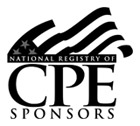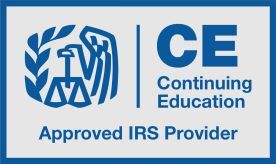

View Details/Register
View Details/Register
View Details/Register
View Details/Register
View Details/Register
View Details/Register
View Details/Register
View Details/Register
View Details/Register
View Details/Register



CPA - medium firm
CPA - large firm
Enrolled Agent
In this webinar, we will discuss sources and standards of tax ethics and best practices to ensure compliance and avoid penalties. In reviewing the requirements of Circular 230, the AICPA Statements on Standards for Tax Services, the AICPA Code of Professional Conduct, the IESBA's Tax Planning Standards, the NAEA Code of Ethics and Rules of Professional Conduct along with rules and regulations from State Boards of Accountancy, we will touch on common practice issues including what standards must be met to take a position on a tax return, when you can omit an answer to a question on a tax return, when you must verify information provided by a taxpayer or third party, the use of estimates, correcting errors and omissions on returns, responsibilities when faced with a conflict of interest, and the form and content of advice provided to taxpayers. We will also discuss the necessity of establishing data security plans, providing tax return documents to third parties, and requirements related to the retention of client records and other documents.
Learning Objectives:
- Recall general ethics principles
- Recognize the key elements of Treasury Department Circular 230 (applicable to those who practice before the IRS)
- Recall the key principles and rules applicable to AICPA members in the AICPA Code of Professional Conduct
- Outline requirements for AICPA members providing tax services as stated in the Statements on Standards for Tax Services (SSTSs)
- Outline the requirements for NAEA members as stated in the NAEA Code of Professional Conduct
- Review other ethical rules promulgated by state boards and the IESBA

Roby Sawyers
Roby Sawyers, CPA, PhD, Professor of Accounting
Undergraduate Program Director
[email protected]
(919) 515-4443
ROBY SAWYERS, Ph.D., CPA, is a Professor in the Department of Accounting at NC State University. He is an author of Federal Tax Research (Cengage Learning) as well as chapters on international tax, state and local tax, tax research, and tax practice and procedure in Corporate, Partnership, Estate and Gift Taxation (Van-Griner). He serves as co-editor and author of the SALT-Block column in Taxes-The Tax Magazine and served as editor of the Tax Practice Responsibilities column in The Tax Adviser magazine from 2018-2020.
Dr. Sawyers is an active member of the American Institute of Certified Public Accountants (AICPA) from which he received the 2020 Arthur J. Dixon Memorial Award. He has served the AICPA as a member of the Tax Practice Responsibilities Committee as well as chair of the Tax Legislation and Policy Committee and the Trust, Estate and Gift Tax Committee. He has also served on the AICPA’s Tax Executive Committee and Precertification Education Executive Committee.
He teaches CPE and CE courses for a variety of firms and other organizations including CPAacademy.org, KPMG and the AICPA.
- To receive CPE credit, you must register for the webinar before it starts.
- CPE is available to all eligible participants within 24 hours of each webinar.
- To receive CPE for multiple attendees, at least one person must sign up for the webinar. The post-webinar email contains a link to instructions for the proctor letter. Alternatively, you may log in to your account following the webinar and click on the MY ACCOUNT button to find a link to instructions. For paid courses, payment needs to be made for each attendee before credit will be issued.

NASBA Approved
CPAacademy.org (Sponsor Id#: 111889) is registered with the National Association of State Boards of Accountancy (NASBA) as a sponsor of continuing professional education on the National Registry of CPE Sponsors. State boards of accountancy have final authority on the acceptance of individual courses for CPE credit. Complaints regarding registered sponsors may be submitted to the National Registry of CPE Sponsors through its website: www.nasbaregistry.org.
CPAacademy.org 1685 S. Colorado Blvd, Suite #205, Denver, CO 80222

EA Approved
CPAacademy.org (Sponsor Id#: HURS9) has entered into an agreement with the Internal Revenue Service, to meet the requirements of 31 Code of Federal Regulations, section 10.6(g), covering maintenance of attendance records, retention of program outlines, qualifications of instructors, and length of class hours. This agreement does not constitute an endorsement by the IRS as to the quality of the program or its contribution to the professional competence of the enrolled individual. Credit earned by attendees with a PTIN will be reported directly to the IRS as required of all providers. To ensure your CPE hours are reported, update your profile in My Account to include your PTIN number. Please note: IRS CE is only mandatory for EAs and ERPAs. For all other tax return preparers, CE is voluntary.
CPAacademy.org 1685 S. Colorado Blvd, Suite #205, Denver, CO 80222
Dr. Sawyers is an active member of the American Institute of Certified Public Accountants (AICPA) from which he received the 2020 Arthur J. Dixon Memorial Award. He has served the AICPA as a member of the Tax Practice Responsibilities Committee as well as chair of the Tax Legislation and Policy Committee and the Trust, Estate and Gift Tax Committee. He has also served on the AICPA’s Tax Executive Committee and Precertification Education Executive Committee.
He teaches CPE and CE courses for a variety of firms and other organizations including CPAacademy.org, KPMG and the AICPA.


